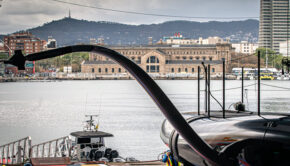Legal troubles loom for America’s Cup
Published on June 20th, 2013
By Cory E. Friedman, Scuttlebutt legal analyst
“Don’t you know what’s goin’ on out there? This is no Sunday School picnic!” – Night of the Living Dead, Public Domain 1968.
“Just when you thought it was safe to go back in the water…,” – Jaws 2, Universal Pictures 1978.
Until recently the shambolic mess that is AC34 has been so busy with its business “issues” that legal issues have been buried. Now that the event is months past the deadline for issuance of a Coast Guard permit and only two weeks from opening ceremonies a potentially show stopping legal issue has arisen which, characteristically, those in charge do not even seem to be aware of.
AC34 could easily wind up mired in litigation, just like AC33.
As you may already know, America’s Cup Event Authority (ACEA) and America’s Cup Race Management (ACRM) cannot get an event permit unless they convince the Coast Guard that they have safety under control. With one unnecessary death already, it is not surprising that the Coast Guard is treating this as a serious issue. (Apparently, insurance – and even a potential source of insurance – has not been tied down either.)
The safety issues that were not resolved as of the start of the confidential mediation presently in progress are many and varied, requiring amendment of the Protocol, Class Rules, race schedules and other documents. Apparently, just about every proposed change will help some teams and hurt others. A lot of oxen will be gored before safety is sorted out.
Where the legal issue arises is a result of Stephen Barclay’s statement that if the teams cannot agree to all the safety changes in mediation, the International Jury (IJ) will decide (so don’t bother taking the mediation too seriously, you get another bite of the apple). Wrong. The IJ simply does not have the power to amend the Protocol or the Class Rules without the consent of whatever teams must consent under the terms of those documents.
So what’s the problem, they can just do it and there is no appeal? Everyone is stuck with their decision? Wrong again. The losing team can go straight to the Commercial Division of the New York State Supreme Court at 60 Centre Street with a very good chance of getting the IJ decision thrown out.
How, can that be if the IJ’s decisions are supposed to be final? Not quite. As the Protocol necessarily provides in section 15.12, the IJ is an arbitral body governed by New York law and the Federal Arbitration Act (FAA). The FAA is very friendly to arbitration with certain key exceptions. New York law is much less friendly to arbitration and often is out of line with the FAA, which New York is required to follow but often does not. NY courts often expand those exceptions.
Application of the FAA should be straightforward, but turns out to be fairly complex. Indeed, the U.S. Supreme Court has issued two split decisions in the past two weeks with different results. What is clear from all the U.S. Supreme Court’s decisions is that a decision that exceeds the arbitrator’s powers can be vacated by a court of relevant jurisdiction – in this case, the New York State Supreme Court as guardian of the Deed of Gift.
There is nothing in the Protocol or Class Rules which even arguably allows the IJ to amend them as it sees fit without the relevant teams’ approvals. Thus, any changes would exceed the IJ’s power and NY Supreme Court could vacate the award at the request of the aggrieved team – after litigation of indeterminate length and a possible stay of the event. The Coast Guard would not even need to drop the hammer.
What this means is that contrary to what Barclay is telling the teams and the world, they had better agree during the mediation or there is not going to be an AC34.
Apparently, somebody is running around claiming that section 16 of the Protocol, which requires compliance with governmental laws and regulations, gives the IJ the power to alter the Protocol and Rules on the basis of safety. That is a laugher. It does not pass the straight face test.
No law or regulation requires any of the safety changes. If they did everyone has been in violation for months. The changes are only necessary to get a permit. Not getting a permit and not running the event is not a violation of any law or regulation. Nor is there any “IJ, do what is necessary clause.” If failing to agree crashes the whole event in flames, the IJ cannot prevent it.
Of course, even if a team believes it was unfairly treated, it need not seek relief from a court if it can live with the changes. A team could also give up all its leverage and take what it gets by disclaiming in advance any resort to the courts.
How did the event get to this sorry state so close to the opening ceremonies?
The answer makes for a long story, but the bumper sticker version is simple. Soon after the Kiwis used Larry’s money to stage a successful hostile takeover of the Cup in Valencia (2010), they ethnically cleansed the operation of Americans, including Oracle’s American licensed in house counsel. In her place they hired a Brit and a Kiwi, neither of which is licensed to practice law (or Medicine or Dentistry, although they may do that as well) in California. (Sometimes they claim they are not practicing law, but just kibitzing about Cup related issues, even though sometimes titled “General Counsel.”) Clearly, they do not have a clue about arbitration in the U.S. under the Federal Arbitration Act. The other things they don’t have a clue about are for another installment, but for now AC34 better find U.S. licensed in house counsel who know what they are doing. Accurate knowledge of the law by all involved is key to avoiding miscalculation.
Hopefully, they will do so before I have to answer the question I was asked today: “What happens under the Deed of Gift if the event doesn’t happen?”
Any reproduction of the information herein
must credit as follows:
Cory E. Friedman/Scuttlebutt
From Stephen Barclay, CEO, America’s Cup Event Authority, on June 23, 2013:
Regarding “Legal troubles loom for America’s Cup”, several points raised by Mr. Friedman are in error. The most egregious:
* “Apparently, just about every proposed change will help some teams and hurt others.” To the contrary, just about every proposed change is supported by all of the teams. In fact 34 of the 37 safety recommendations had been unanimously agreed by the four teams prior to mediation. As Grant Dalton, the managing director of Emirates Team New Zealand said when the recommendations were released, “They are prudent and reasonable.”
* “The IJ simply does not have the power to amend the Protocol or the Class Rules”. It was never the intention to ask the IJ to amend the Protocol and/or Class Rule. The mediation has now concluded and the Regatta Director will proceed to give effect, in accordance with the Protocol, to the 37 Safety Recommendations
For this edition of the America’s Cup, the International Jury has been empowered to resolve all disputes, and the teams have all agreed in writing not to resort to any court of law.
Historically, US Courts have been loath to get involved in sports where there is a properly constituted judicial body like the 34th America’s Cup International Jury. This Jury is the same as 33rd America’s Cup. Nobody, not even Mr. Friedman, has suggested that the 34th America’ Jury is not properly constituted.
All of us involved in the America’s Cup are working together to make this a great event for sailing, fans of sailing, and San Francisco.
In response to Stephen Barclay, Cory E. Friedman submits on June 23, 2013:
Stephen Barclay’s quibble with my recent piece does not seriously dispute anything I wrote, which I take as tacit agreement and a compliment. While I cited to two recently decided U.S. Supreme Court cases (a third was just decided), Mr. Barclay, who is not a lawyer, blithely claims, without any support at all, that “US Courts” are “loath” to interfere with “properly constituted” sports juries like the AC 34 and AC 33.
Mr. Barclay need only scan the cases applying the Ted Stevens Act, 36 U.S.C. Sec. 220501 et seq. of the United States Code, to see that is incorrect. The issue is not whether a jury is properly constituted; it is what the jury does. If it violates the Federal Arbitration Act, our courts have no problem striking the action down.
Mr. Barclay cannot be faulted for not knowing the actual facts about AC 33, which was before his time. Those who were following AC 33 in detail will recall that the International Jury, headed by Mr. Peter, found in favor of Société Nautique De Genève (SNG)/Alinghi on all issues and ruled that CNEV was a proper challenger of record. The New York Supreme Court completely disregarded the decisions of that properly constituted International Jury and ruled the exact opposite way. That is why AC 34 is in San Francisco.
Mr. Barclay does not specify any grounds for his claim that the Protocol allows the allegedly neutral Regatta Director to ram one team’s preferred terms down the throats of the other teams; merely that he will do it, thereby stripping away any pretense of neutrality, fair play or sportsmanship.
Obviously, if a boat is unbalanced and unstable at foiling speed without adjustable rudder elevators, that is a design/speed issue, not a safety issue. They should go back to the shed or sail at the speed they are comfortable within the existing rules. The Regatta Director should not be putting his thumb on the speed scale in the specious name of safety.
Clearly, Mr. Barclay does not dispute that there is no Hail Mary article of the Protocol that allows a partisan Regatta Director to do whatever he or she pleases. I continue to believe that the answer is compromise, not diktat. If a team wants something, it has to give something. If Mr. Barclay really is “working together to make this a great event,” that is a better way to get there.
Finally, Mr. Barclay really got me on one point. I think most ‘buttheads read my statement to mean that “just about every [significant and/or disputed] change will help some teams and hurt others,” not that I meant undisputed already implemented changes. So to the charge that I was imprecise in my haste to meet a deadline and get my piece to ‘buttheads around the world, the answer is: mea culpa, mea maxima culpa, guilty as charged.








 We’ll keep your information safe.
We’ll keep your information safe.